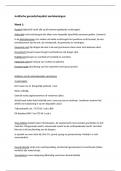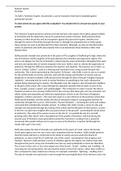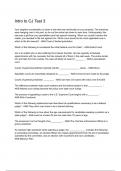Lecture 1: Substance Dualism ............................................................................................................................................... 2
1. What is philosophy? .............................................................................................................................................................. 2
2. Why philosophy for psychologists?....................................................................................................................................... 2
QUESTION 1: What is the conscious mind? .................................................................................................................................... 2
QUESTION 2: Can the mind function separately from the brain? ................................................................................................. 3
Lecture 2: Idealism & Behaviorism ........................................................................................................................................ 7
1. Idealism/Immaterialism ->.................................................................................................................................................... 7
QUESTION 3: Is there only mind? ................................................................................................................................................... 7
2. Behaviorism -> ....................................................................................................................................................................... 8
QUESTION 4: Is there only behavior? ............................................................................................................................................. 8
2.1. Psychological (=methodological) behaviorism: .......................................................................................................... 8
2.2. Philosophical (= analytical = linguistic) behaviorism: ................................................................................................. 9
2.3. Problems with behaviorism: ..................................................................................................................................... 10
3. Summary: ............................................................................................................................................................................. 11
......................................................................................................................................................................................... 11
LECTURE 3: Identity Theory................................................................................................................................................. 12
QUESTION 5: Is the conscious mind part of the brain? ......................................................................................................... 12
1. Another type of monism: Materialism ................................................................................................................................ 12
2. What is identity? .................................................................................................................................................................. 12
3. MBIT -> Mind body/brain identity theory .......................................................................................................................... 13
4. Arguments for/against MBIT .............................................................................................................................................. 15
5. Conclusion ............................................................................................................................................................................ 15
LECTURE 4: Functionalism................................................................................................................................................... 17
Question 6: Can machines have conscious minds? – Functionalism ...................................................................................... 17
1.1. Comparing functionalism with behaviorism and MBIT................................................................................................. 17
2. Alan Turing: The Turing machine ........................................................................................................................................ 18
3. Evaluation of functionalism ................................................................................................................................................ 19
LECTURE 5: Connectionism............................................................................................................................................................ 21
4. Connectionism (as an alternate to cognitivism)................................................................................................................. 21
LECTURE 6: Embodied/Embedded/Extended Mind .............................................................................................................. 25
Recap: ............................................................................................................................................................................... 25
Question 7: The embodies, embedded and extended mind: ................................................................................................ 25
Is Google Maps part of the conscious mind? ........................................................................................................................ 25
1. The embodied & embedded mind ....................................................................................................................................... 25
2. The extended mind .............................................................................................................................................................. 27
2.1. Introduction leading to the extended mind hypothesis (EMH) ............................................................................... 27
2.2. Extended mind hypothesis ........................................................................................................................................ 27
2.3. Arguments pro and contra EMH................................................................................................................................ 28
1
,Lecture 1: Substance Dualism
1. What is philosophy?
• Philosophy is:
o Conceptual analysis
Scientific research provides us with a scientific world view
Everyday world view = manifest world view
Relation between different world views
o Conceptual clarification
Using science itself to clarify concepts
o The science of validity
In science you use all kinds of concepts, like the concept of ‘causality’
Usually you use the concept without asking questions about that concept –
but are these concepts valid?
o A training in changing perspectives (train to have an eye for other options, switch
your perspectives, necessary to partake in debates)
o Search for the truth
Ancient Greek: sophists: teachers taught techniques to win arguments -> not
truth is important, but winning (like lawyers)
Socrates -> against this technique
o Taking a step back, think about what we mean by our concepts, sometimes change
perspectives, in order to clarify them, if we are using the right treatment, etc.
2. Why philosophy for psychologists?
• Academic thinking -> Because philosophy is critical thinking
• Thinking critically about different things, like ethical questions or questions about
consciousness/psyche
• The hard problem: consciousness seems to be completely different from other types of
phenomena
-> because people have dualist intuitions = spontaneous assumptions that the mind and
the body are two different things that can function separately from one another -> but
there also seems to be some kind of interaction
QUESTION 1: What is the conscious mind?
• 3 mental states: 1. conscious experiences, 2. cognition, and 3. emotions
o 1. Conscious experiences
“What-it-is-likeness” (article by Nagel)
We all have experiences of taste, color, etc.
Bats have echolocation – what it is like to be a bat and feel echolocation?
=> Qualia (singular: quale) -> qualitative aspects of (phenomenal) experiences
o 2. Cognition
2
, About cognitive states:
Propositional attitudes (PA’s) = we take a particular attitude/stance towards
a proposition
John believes that it is raining (proposition: rain, attitude: believing)
Cognitive states have intentionality -> (not intentions) PA’s are about
something (aboutness)
PA’s are also discrete entities = when I change one PA, it does not necessarily
have an effect on another PA
o 3. Emotions
Have:
- qualitative character (e.g. feeling the anger or butterflies in your stomach) and
- intentionality (e.g. being mad at somebody or in love with somebody)
• The general problem: “How does the conscious mind fit in the physical world?”
o 3 subproblems:
How do conscious experiences fit in the physical world?
How do cognitive states fit in the physical world?
How do emotions fit in the physical world?
o Reduction: because emotions have two properties (qualia and intentionality)
How do qualia fit in the physical world?
How does intentionality fit in the physical world?
o Different views:
Substance-dualism -> mind and body are independent of each other
Idealism -> physical world is dependent on the mental (spiritual) world
Behaviorism -> the mind is behavior
Reductionism / identity theory -> mental states are certain brain states
Eliminativism -> there’s no mind
Functionalism -> mental states are not identical to brain states, but they are
realized by brain states
Connectionism -> mental states are states in a neural network
Embodies & embedded (+ extended) mind -> there is more to mind than
brain (context) – more in lecture 6
QUESTION 2: Can the mind function separately from the brain?
• Substance: can exist on its own
• Substance-dualism: (René Descartes): two things that can exist on their own separately:
o Res cogitans (“thinking substance”)
o Res extensa (“physical/extended substance”) -> 3D, takes place in space
• Essential properties/Foundation:
3





